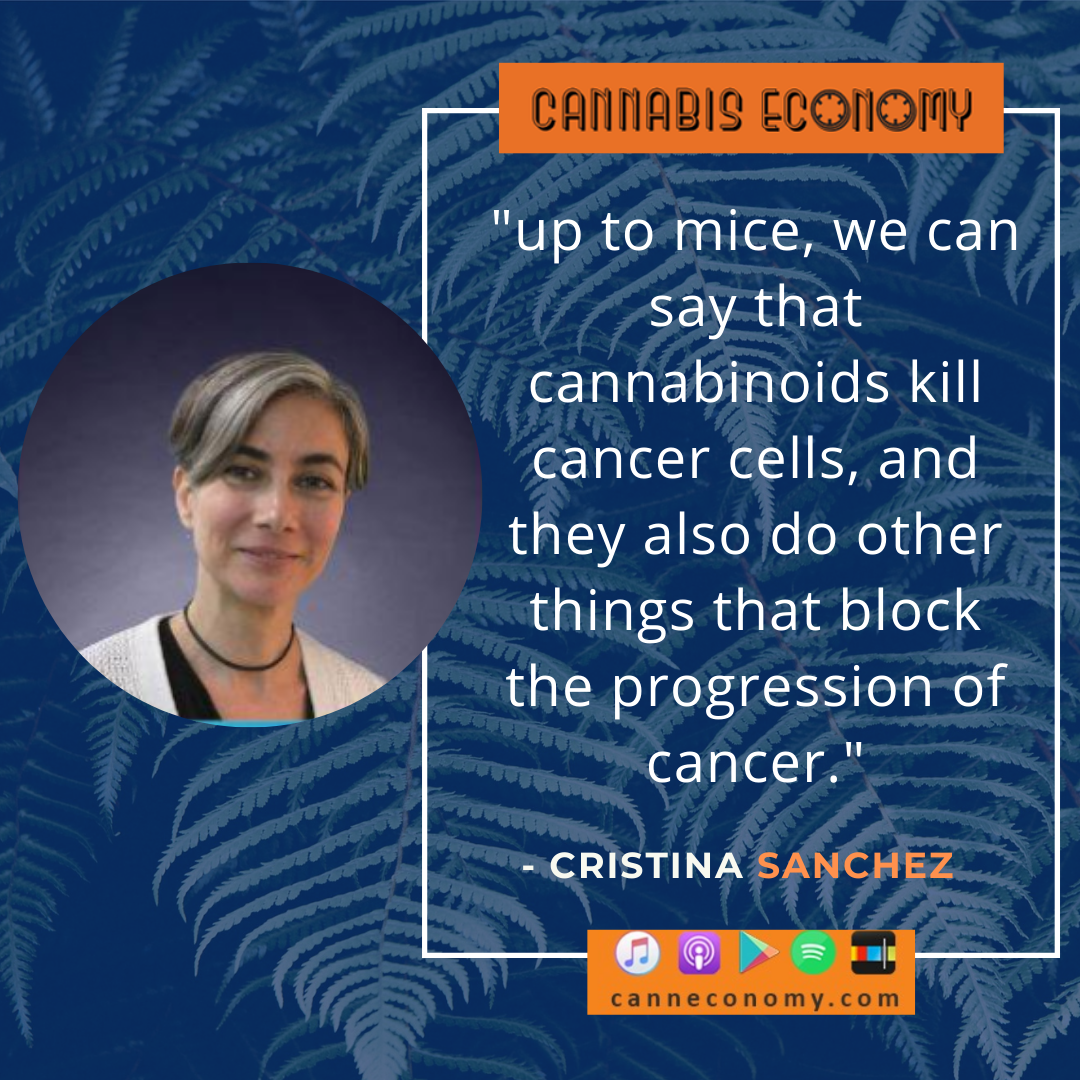
Ep. 481: Prof. Cristina Sanchez
October 24, 2019Dr. Cristina Sanchez, a molecular biologist at Compultense University in Madrid, Spain, is working to uncover whether or not cannabinoids are useful tools for fighting cancer — not just by combating the negative side effects of chemotherapy, but also by exhibiting actual anti-tumor activity. She notes that, in her and her team’s pre-clinical studies with mice, cannabinoids do, indeed, kill cancer cells as well as many other things that block the progression of cancer. Although we don’t have studies studying the effects of cannabinoids on cancer in humans, there are many testimonials from patients that claim the use of medical cannabis has, in fact, slowed down their disease. Anecdotal evidence alone is not sufficient enough to begin treating patients with cannabis, but Sanchez believes that it is a useful perspective, especially in conjunction with clinical studies.
Transcript:
Seth Adler: Professor Cristina Sanchez join us. Welcome to Cannabis Economy, I'm your host, Seth Adler. Download episodes on CannEconomy.com. That's two Ns, and the word economy, or wherever you currently get your podcasts.
Seth Adler: The audio for this one might sound different. That's because it's also a video that's available at CannEconomy.com. You can go there and see it there, or you can just simply stay tuned and listen here. First, a word from Bedrocan, and then Cristina Sanchez.
Seth Adler: Bedrocan is a patient-driven, global, pharmaceutical-minded cannabis company. Their entire end-to-end process is GMP certified through Dutch, and ultimately European authorities. Bedrocan is the market leader in Europe for medical cannabis, and has been the sole supplier to the Dutch government for 16 years. Through the Dutch government, Bedrocan provides product to 15 countries, currently.
Seth Adler: As a science-based company, Bedrocan invests in clinical research. The Laden University conducted a double-blind, placebo controlled clinical trial on fibromyalgia, with Bedrocan products, which yielded promising results. They're now working on a follow up to that study. Bedrocan is also working on the extent to which cannabis can reduce a reliability on opioids. Bedrocan believes that clinical research is key for the future of the company, standardized product, the industry, and the patient. Visit Bedrocan.com for more information.
Seth Adler: Okay, it's Professor Cristina Sanchez. Professor, thank you so much for your time. Thank you for doing this.
Cristina S.: Thank you for having me, [inaudible 00:01:49].
Seth Adler: It should go without saying, but I would be remiss if I didn't mention the fact that Mara Gordon is the person that put us together.
Cristina S.: Mm-hmm (affirmative). Yeah, I thank her for this opportunity.
Seth Adler: There we go, okay.
Seth Adler: You have been doing this for quite some time. I can't wait to uncover what you have been doing. If you could say it in one sentence, please share with us what your work has been with cannabinoids?
Cristina S.: Well, our group has been working on cannabinoids and cancer, specifically trying to understand whether these tools are good tools to fight against cancer. Not only to fight against the side effects of chemo, or the pain, not only palliative actions, but also anti-tumoral actions.
Seth Adler: Okay. Anti-tumoral is a specific, a major component of what you're doing?
Cristina S.: Yeah, it's the main focus of our research.
Seth Adler: What would you say, if I said, is it?
Cristina S.: Well, we are pre-clinical researchers. That means that our patients are mice. So, up to mice, we can say that cannabinoids kill cancer cells, and they also do other things that block the progression of cancer. They inhibit a process that is called anti-genesis, which is the process that feeds tumoral cells, also the metastasis, which is the generation of new tumoral masses that are actually the main cause of cancer associated deaths.
Read the full transcript:
Become a member to access to webinars, quarterly reports, contributor columns, shows, excerpts, and complete podcast transcripts
